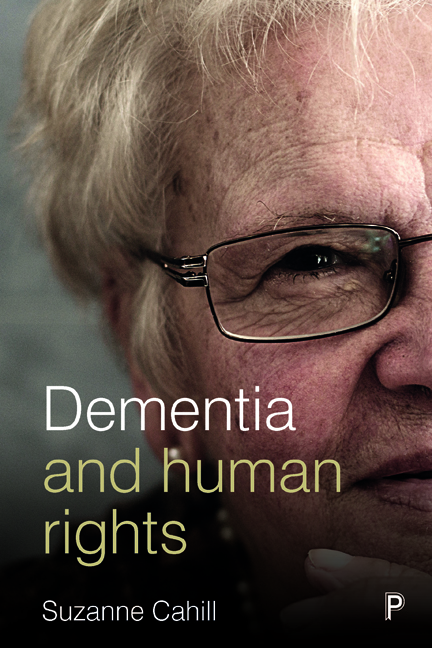six - Emerging public policy on dementia: the implications of a human rights-based approach for policy and practice
Published online by Cambridge University Press: 22 April 2022
Summary
Introduction
The purpose of this chapter is threefold. First it aims to outline those global and European events that have led to the development of public policy on dementia during the last decade. Here it is argued that as a policy area, dementia has only recently been prioritized (Milne, 2010; Wortmann, 2013). And whilst in the past dementia policy lacked clinical and political ownership (Banerjee, 2013), and straddled several different governmental departments (Manthorpe and Adams, 2003), often cross-cutting the boundaries of ageing and mental health policy (Marshall, 1999), nowadays, many countries are developing their own dementia-specific policies (WHO, 2012, 2016; Pot and Petrea, 2013; OECD, 2015) designed to address the significant challenge dementia poses. This part of the chapter briefly reviews a selection of national dementia strategies that are available in English. It shows how a rightsbased discourse is gradually beginning to penetrate some, but not all, of these newly developed strategies.
The second part of the chapter advances to a discussion from a human rights-based perspective of practice-based issues in dementia care. It commences by presenting recent data on dementia and human rights collected from a survey of health service professionals and care staff. Based on these findings, it argues for the need for practitioners to be upskilled in human rights principles and legislation.
The third and final part of the chapter raises some critical questions for practitioners relating to equality and justice concerns, and attempts to interrogate dementia care practice by applying human rights principles to everyday, real-life situations. In this final section some synergies are drawn between elements of person-centred care practice (Brooker and Latham, 2016) and human rights principles.
Public policy on dementia
Policy-makers have a growing interest in dementia (Quaglio et al, 2016; Wu et al, 2016), which is now regarded as a key challenge of the 21st century (Wortmann, 2013). Rising prevalence rates combined with the burgeoning cost of dementia and delays in finding a cure (Winblad et al, 2016) are likely to have fuelled this interest. In the past, public policy on dementia fell between the cracks of policies for older people and mental health policy (O’Shea and O’Reilly, 1999), and was often tacked on to both these areas (Manthorpe and Adams, 2003).
- Type
- Chapter
- Information
- Dementia and Human Rights , pp. 131 - 156Publisher: Bristol University PressPrint publication year: 2018



